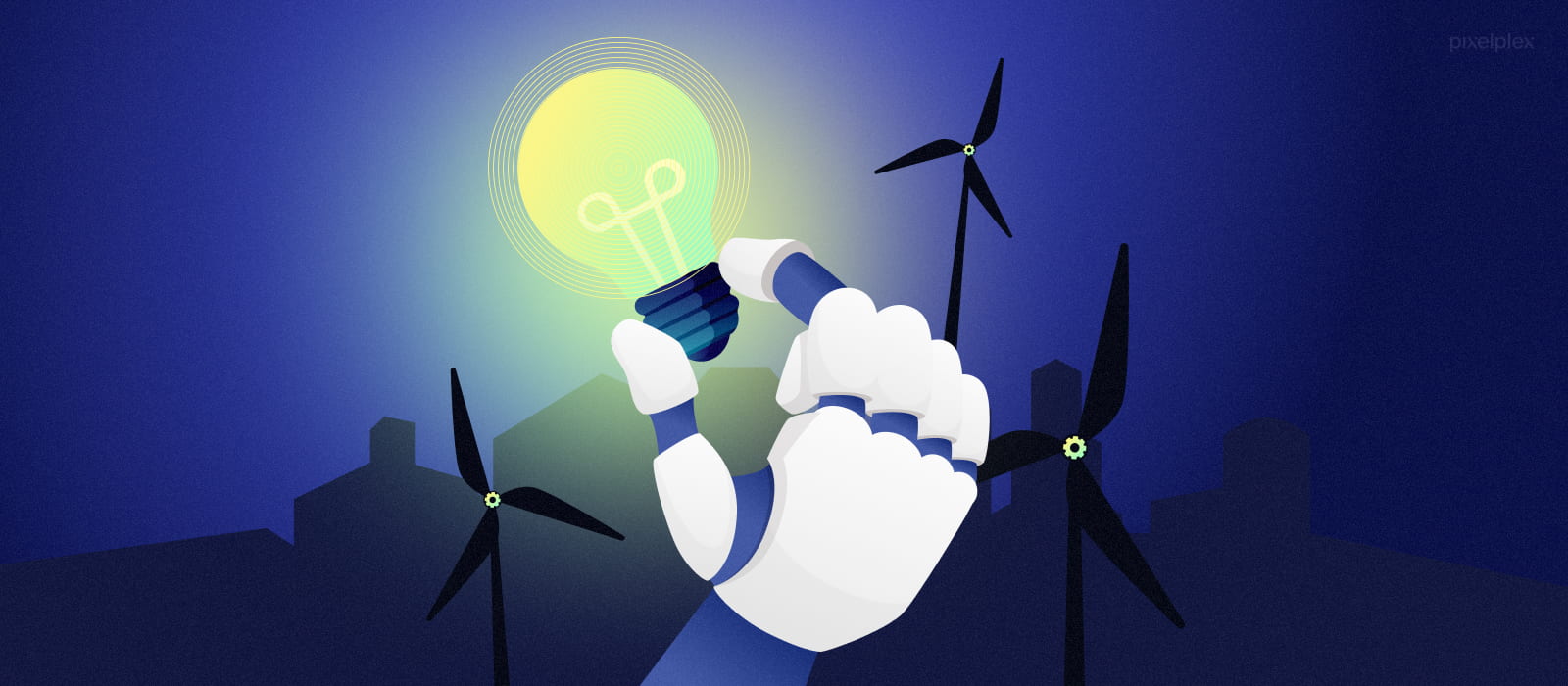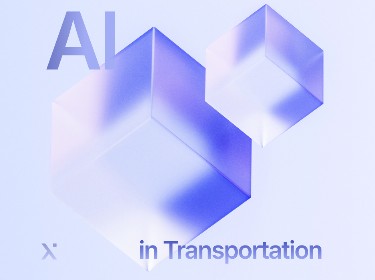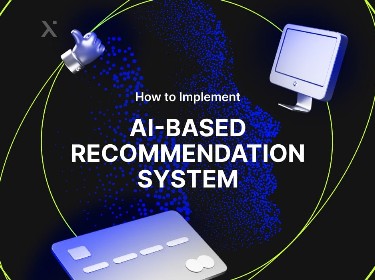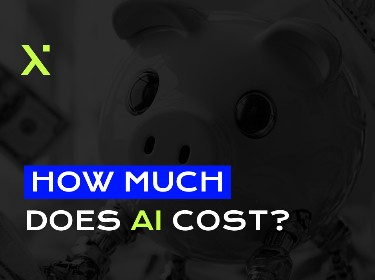Artificial intelligence is now developing at a rapid pace, transforming familiar processes and patterns across numerous domains. What benefits can it bring to the energy sector?
There are several pressing issues looming over the energy industry, with exhaustibility of traditional energy sources and their harmful environmental impact being key concerns.
Luckily, artificial intelligence promises to transform the energy industry by making energy generation a more sustainable process and increasing the efficiency of resource distribution.
Energy companies’ interest in AI capabilities is evident from the statistics: the global AI energy market is expected to reach $7,78 billion by 2024.
In this article we will examine how exactly AI can benefit the energy sector and how the technology can be applied to the different industry processes. We will also look at the industry leaders that have already adopted artificial intelligence in their workflows.
Major benefits of leveraging AI in energy industry
![]()
AI in energy industry can help ensure efficient energy production, reduce carbon footprint, cut down costs, create a safer working environment, and achieve better customer appeal.
Here is a more detailed overview of all the benefits.
Efficient energy production
AI is able to process tons of energy-related data fast and efficiently. It can be any relevant information, from historical data on energy consumption to reports on power outages and system overloads. AI can then identify patterns and dependencies, and provide actionable strategies for optimizing energy production and distributing it between high and lower demand hours and locations.
Reduced carbon emissions
Since leveraging AI in the energy sector allows for defying the exact amount of energy needed in a specific time or location, providers can tailor their energy production precisely to meet customers’ needs. No excess energy generated — less carbon emitted into the atmosphere.
Artificial intelligence can also help predict periods when renewable energy sources are available, for example sunny or windy days. This way, energy providers will be able to better plan their production strategy, using sustainable energy sources as much as possible.
Meet Circularr — a blockchain-based solution helping to reduce plastic pollution and encouraging eco-conscious consumer behavior
Reduced costs
AI in the energy industry also allows companies to cut down on ongoing expenses. For example, energy businesses can use artificial intelligence for predictive machinery maintenance, providing an opportunity to detect and handle possible malfunctions early on. This will help avoid expensive repairs and money loss in the case of a shutdown.
Moreover, reduced production expenses for energy companies can mean more affordable energy offers to customers. This is where web development services for the energy and utilities industry can play a crucial role, creating online platforms that allow consumers to easily monitor their energy usage, compare pricing plans, and manage their accounts, ultimately leading to cost savings.
Safer working environment
Energy specialists often work in dangerous environments (e.g. offshore drilling rigs or high voltage power lines) and are exposed to hazardous materials and risks of accidents or explosions.
Artificial intelligence can reduce this danger by automating tasks such as monitoring the performance of machinery located in remote or hazardous areas.
Additionally, IoT services for the energy and utilities industry can provide real-time data on equipment performance and environmental conditions, enabling proactive safety measures and reducing risks for workers.
Better customer appeal
Nowadays many customers pay close attention to the steps energy businesses take towards becoming more sustainable and cutting down on using non-renewable energy sources. Leveraging AI to tackle these environmental issues can stand as solid proof that an energy provider is investing in more eco-friendly solutions and processes, and thus provide a competitive market advantage.
Mobile development services for the energy and utilities industry can further enhance customer appeal by providing user-friendly apps that allow customers to track their energy consumption, manage their bills, and even control smart home devices to optimize energy usage.
Challenges of applying AI in energy sector
While the adoption of AI in the energy industry brings significant benefits, companies may face a number of challenges. There are risks associated with technical unfamiliarity, unwillingness to change, lack of qualified personnel, outdated infrastructure, and potential cybersecurity risks.
How exactly do these issues hinder the introduction of AI in the energy industry?
Tech unfamiliarity
Even though AI is now the word on everybody’s lips, few people actually understand how the technology works and what its capabilities and restrictions are. Therefore, energy companies stakeholders may not see the benefits of investing in the technology.
Unwillingness to change
To effectively introduce artificial intelligence in an energy business, stakeholders and staff should be open to change. This means working out new workflows and learning new skills, which some will find difficult.
Lack of qualified personnel
Successful implementation of AI into energy companies requires the supervision and guidance of well-versed specialists who are not only proficient in AI technology but also understand the industry’s specifics (which is yet a rare specimen).
Outdated infrastructure
Artificial intelligence solutions need comprehensive data to perform well. However, if a company has an outdated infrastructure, collecting an all-encompassing dataset can be a difficult task. That’s why, before implementing AI, many energy businesses need to update their infrastructure and ensure their data storage and management system is up and running.
Cybersecurity risks
The energy sector is an essential component of the global infrastructure, which is why cybersecurity breaches are considered a significant threat. Some people are critical about incorporating artificial intelligence into industry operations due to concerns that the technology may make energy systems and sensitive data vulnerable to cybercriminals.
What are the major cybersecurity threats you should know about? Let’s find out
Top 6 use cases of AI in energy industry
![]()
Among the most prominent applications of AI in the energy sector are enhanced data management and data analytics, improved development of equipment and facilities, better equipment management, efficient waste storage and disposal, and more engaging employee training.
Let’s examine each of these use cases in more detail.
1. Data management
Energy companies generate tons of valuable data, but they often don’t extract its full value due to poorly organized data storage and the physical inability of humans to quickly process this much information. This is where AI comes to help.
The technology can swiftly analyze large amounts of data, classify it, and find patterns and anomalies. All of this makes it easier to find actionable insights and improve workflows of energy providers.
2. Data analytics
Using both internal data collected by the energy provider and publicly available industry information, AI can perform thorough analytics and suggest improvements to current business processes.
AI in the energy industry can analyze:
- energy demand
- equipment maintenance
- energy generation efficiency
- the amount of generated waste
- availability of renewable and non-renewable energy sources
- energy trading and pricing trends
- industry risks (e.g. energy theft)
Get acquainted with our big data consulting services
3. Facilities and equipment development
Energy businesses can leverage artificial intelligence to make digital twins. These are interactive digital models that enable better planning and design of facilities and machinery, which makes it possible to assess a project’s feasibility without building real-life prototypes.
Probably the most game-changing advantage of digital twins for the energy industry is the ability to conduct various experiments and see how different facilities and mechanisms will function under different workloads and conditions, including emergencies.
4. Equipment management
As well as using artificial intelligence for predictive machinery maintenance, energy companies can adopt the technology for better equipment adjustment to achieve the best possible performance. For example, AI can suggest the most efficient angle of a wind turbine’s blades based on the direction and speed of the wind.
5. Waste storage and disposal
The energy industry generates a considerable amount of waste which can greatly affect the environment if not stored and disposed of properly. AI can help handle this issue by suggesting more secure waste management procedures.
For example, the technology can analyze and assess the short-term and long-term effects of different radioactive substances, as well as their susceptibility to various conditions and materials. This way, researchers will gain a deeper understanding of the safety levels of existing radioactive storage facilities and identify ways of sustaining and improving them. This will help construct more secure nuclear waste storage facilities, or find methods of complete waste disposal.
AI can also be beneficial for companies that extract energy from renewable sources, since they still have to figure out how to dispose of their broken equipment, such as solar panels or wind turbines. Artificial intelligence can identify the most valuable materials in these components and suggest ways of reusing or recycling them.
Take a look at MECA — a blockchain-powered system for monitoring and managing the radioactive materials supply chain
6. Employee training
AI in the energy industry can also be applied to employee training. With AI-based chatbots, the process of learning and reviewing industry-related material becomes more engaging and productive, allowing employees to keep their knowledge sharp and remain well prepared for any situation.
3 real-life examples of using AI in energy industry
AI in energy makes it possible to execute better planning and facility management, minimize environmental load, and optimize energy storage and distribution. That’s why many world-famous energy companies have already incorporated artificial intelligence into their processes. Giants such as Shell, Chevron, and Saudi Aramco are among them.
Here is a closer look at how exactly each of these companies uses AI.
Shell
Shell, one of the world’s largest oil and gas companies, actively leverages artificial intelligence across its production processes. The company currently has over 100 AI applications helping them to improve inventory demand planning, avoid wastage of products and raw materials, and decrease machinery idle time.
The technology also helps with predictive maintenance of Shell facilities. According to Dan Jeavons, vice president of computational science and digital innovation at Shell, 10,000 pieces of equipment are currently being monitored by AI.
In addition to this, the company has teamed up with C3 AI, Microsoft, and Baker Hughes to work on the Open AI Energy Initiative (OAI). This is an ecosystem of AI-based solutions whose goal is to facilitate the energy industry’s digital transformation. The OAI enables energy companies and vendors to build interoperable solutions on the BHC3 AI Suite and Microsoft Azure.
Chevron
The Chevron energy corporation uses artificial intelligence to build digital twins of its facilities. With the help of these digital replicas, Chevron employees can quickly access any required data and perform predictive equipment maintenance and optimization.
The company also applies artificial intelligence to accelerate research. For instance, to examine subsurfaces, geologists used to drill multiple wells in order to gather data. AI greatly reduces the number of wells required by making precise predictions about underground conditions based on historical data. This not only streamlines the workflow but also reduces Chevron’s environmental footprint.
What are the advantages of digital twins in manufacturing? Find out in our article
Saudi Aramco
Saudi Aramco, a petroleum and natural gas enterprise, has set a goal to become the leading digitized energy company, and is actively implementing artificial intelligence into its processes.
For example, the technology is used on Abqaiq, the company’s biggest oil processing facility and the largest crude stabilization plant in the world. The technology enables automated adjustments of the oil stabilization process, resulting in increased power generation performance and significant reduction in CO2 emissions.
Saudi Aramco also uses AI to predict flaring (the release and combustion of hydrocarbon gas), which allows it to start immediate remedial action.
Conclusion
AI promises to enhance traditional energy industry workflows by delivering better data analytics, more efficient energy generation and distribution, reduced reliance on non-renewable energy sources, advanced waste management strategies, and more. An oil and gas software development company can help integrate AI into your existing systems, providing tailored solutions that optimize both operations and sustainability efforts.
Thinking of modernizing your business to improve operations and increase competitiveness? Artificial intelligence may be just the technology you are looking for. Our AI specialists are ready to provide you with all the necessary assistance and insights into how the technology can benefit your company. Feel free to reach out to us.




